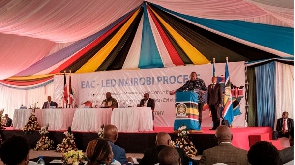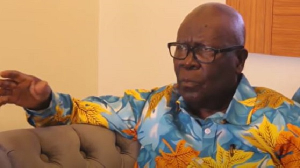The East African Community is banking on a push by its facilitator of the peace process in the Democratic Republic of Congo to return the warring parties to dialogue, after months of grandstanding.
This week, the facilitator, former Kenyan President Uhuru Kenyatta, arrived in Goma, eastern DRC, as part of his efforts to bring the rebel M23 and the government to peace.
Congolese officials, including the Minister for Regional Integration, Mbusa Nyamwisi, and Deputy Prime Minister in Charge of Defence, Jean-Pierre Bemba.
This was the second meeting of the technical teams for peace in the east of the DRC.
“We are not here to open new negotiations. All the negotiations have already been done. Together with the UN and the countries that are friends of the DRC, we have come to continue the negotiations to ensure that the parties involved respect the agreements made in Luanda and Nairobi,” Mr Kenyatta said.
In his view, the negotiations must include all the armed groups.
Mr Kenyatta called for the various regional peace initiatives to be pursued, so that “the Congolese can talk to each other to resolve the problems of this great nation".
"We are asking the Congolese people to be united so that together we can seek the paths that lead to peace so that we can find the means for the citizens of this country to live in peace and unity, and that is the development they deserve to have, through peace, and so that your country is respected in the world," he said.
The meeting was also attended by the Representative of the UN Secretary-General in the DRC and head of the peacekeeping mission, Monusco, Bintu Keita, representatives of governments of the US, France, Belgium and Switzerland as observers, the military command of the EAC regional force (EACRF), and officials from Angola.
Yet Kenyatta's arrival came at a time the ceasefire between M23 and the Congolese armed forces (FARDC) was beginning to break down, with sporadic fighting between the M23 and the Wazalendo armed groups who claim to be defending Congolese territory.
Kenyatta is pushing for an agreeable cantonment of the M23 in the Rumangabo camp in North Kivu, eastern DRC. There has been a deadlock.
“It shall be noted that our organisation did not make any commitment regarding the pre-cantonment, cantonment, and disarmament programmes," said Benjamin Mbonimpa, M23 secretary, in a July 7 statement.
M23 still calling for dialogue
The rebel group is still calling for dialogue with the DRC government, nonetheless. But Kinshasa has refused for over a year now.
Two weeks ago, Mr Kenyatta brought together the stakeholders in the Congolese crisis in Nairobi and urged everyone to play their part in bringing back the much-needed peace.
“We have done a good job so far... but I strongly believe that we will not be able to achieve that unless we work together unless we have one singular common objective,” he said at the Nairobi meeting also attended by representatives of the United Nations, the Congolese government, the African Union, the International Conference on the Great Lakes Region and the East African Community.
“We must find a way of encouraging all the armed groups, all armed groups to lay down their weapons and join in the peace process.”
On Tuesday, Nyamwisi declared that “the (DRC) government is in action to negotiate the turnaround needed to restore the peace so longed for here.”
But it could all depend on how DRC responds to the Kenyatta overture that all groups including M23 be invited to the table.
Sources told The EastAfrican this week that part of the enticements for parties to lay down the arms is a voluntary cantonment programme for armed groups, which will then be allowed to the table of the talks known as the Nairobi Peace Process, which Kenyatta leads for the EAC.
The proposal is tricky and the M23, which had often blamed other armed groups and the government of DRC for provocation, also accused international observers this week of looking on as fresh violence erupted.
M23’s Political Spokesperson Lawrence Kanyuka claimed on Wednesday there had been “continual killing of our compatriots in Masisi, Bwito and their surroundings by the DRC Government”.
Kinshasa is refusing to publicly confirm if ready to negotiate with the M23, despite a push from South African President Cyril Ramaphosa, and an inclusive idea fronted by the East African Community that all parties be involved in dialogue this time.
And Ramaphosa, on a trip to Kinshasa on Thursday last week urged his counterpart Félix Tshisekedi to open talks with the rebels.
“We have agreed that the best way to resolve this conflict is through negotiation. We need to find a framework for negotiation. And President Tshisekedi has never been against negotiation,” he told a joint press briefing.
The South African president said the war in the DRC affects the whole region and welcomed the involvement of the SADC, the EAC, Angola and the African Union in finding lasting peace in the DRC.
SADC troops are expected in DRC from September, according to a provisional programme issued by the Southern Africa bloc this week.
President Tshisekedi nevertheless told his South African counterpart that: “Everybody knows that Rwanda is backing the M23 despite its denials and the various documented reports by United Nations experts; this country lives off this war of aggression against the DRC to feed its economy.”
“Rwanda's strategy consists of pushing the DRC to negotiate with an M23 group, while they are going to create a dissidence in reserve to continue with a war of predation vital to their economy.”
Despite an imminent fresh round of talks planned for rebel groups, the skies seem cloudy on whether it will happen at all.
Nonetheless, the EAC’s Facilitator thinks a voluntary cantonment, rather than force, and consultations with all armed groups willing to sue for peace, will prevent a relapse of violence as seen so far.
The proposal means the M23 can resume dialogue participation under the Luanda Agreement fronted by Leaders of the EAC and the International Conference on Great Lakes Region (ICGLR) reached last year in November for all groups to withdraw or be forced to.
“The cantonment aspect presents a sensitive and urgent challenge. We must ensure that all parties are adequately consulted and reach an agreement regarding this crucial stage,” Kenyatta said after a meeting last weekend.
“It is imperative to address all necessary technical and logistical matters including establishing open and indirect lines of dialogue and consultation with the armed groups we aim to canton.”
A determiner
The voluntary cantonment will determine whether a new programme for the Disarmament, Demobilisation, Community Recovery and Stabilisation is launched. M23 have often argued they re-picked up arms because a previous cantonment nearly a decade ago sort of created prisons for them and that they were neglected after they quit violence.
Kenyatta says armed groups that agree to it will be voluntarily disarmed and settled into habitable cantonment areas. The M23, seen as the most active armed group in the region, had been removed from a round of talks involving armed groups as they refused to quit violence initially claiming they had been attacked often by government forces. In turn, Kinshasa termed them terrorists and accused Rwanda of fuelling their war. It refused to negotiate any peace deal with them as long as they fought.
This week, President Paul Kagame of Rwanda, whose country has argued in the past that M23 are an important party to the peace bid, accused Kinshasa of the continual portrayal of the group as the only cause of the conflict in Eastern DRC. He argued that obscures other armed groups like the FDRL from blame.
Citing the final UN Group of Experts report on DRC, President Kagame claimed there is a growing tendency to selectively highlight some aspects of problems in Eastern DRC.
"They always say M23 and then they are quiet, or they speak in whispers when they talk about FDLR and we are talking about over 120 armed groups in Eastern Congo,” President Kagame said as the country marked Liberation Day celebrations, locally known as Kwibohora, which commemorates the end of the 1994 Genocide against the Tutsi.
“They only highlight M23 and ADF. But FDLR, these genocidaires who have become part of the national army of (DR Congo) …they assume these people do not exist and that it is not even a problem we should be talking about.”
Meanwhile, Kenyatta’s office said a reconnaissance tour of the Rumangabo pre-cantonment site has been done to assess its suitability to hold armed groups operating in the region with M23 expected to move from Kibumba and Sake areas towards Rutshuru to allow the cantonment process.
This follows a meeting held in Nairobi chaired by Kenyatta that sought to reach a consensus on how to collectively achieve the final stage of the peace process that was initiated in November after the Luanda summit.
This includes cessation of hostilities and withdrawal of armed groups from their forward positions to designated positions ahead of their disarmament and cantonment.
Four months after the Luanda deal, progress had been achieved with M23’s withdrawal and cessation of hostilities. Then it was followed by reports that the group had returned to old areas, hostilities resumed and confrontations between the various armed groups ensued. Additionally, tensions emanating from DRC’s criticism of the EAC regional force delayed the renewal of the Mission’s mandate as fresh rounds of dialogue were also delayed.
The meeting in Nairobi, last week, also brought together Ms Bintou, Keita the Special Representative of the Secretary General of the United Nations in DRC, EACRF Commander Maj-Gen Alphaxad Kiugu, EAC member states’ representatives, DRC Deputy Prime Minister and Minister of Foreign Affairs Christophe Lutundula, Lt-Gen Nassone Joao the head of the Ad-Hoc Verification Mechanism and Angola representative, Maj-Gen Ally Mzee Katimbe, the military advisor to the EAC Secretary General among other members of the diplomatic community.
MS Keita said the UN supports the voluntary cantonment.
The US had on its part reiterated its call for Rwanda to cease its support for M23 but also blamed DRC for arming certain armed groups to target M23.
“We call on all armed groups including M23, CODECO, FDLR, Mapi and others to cease hostilities and lay down their weapons,” Department of State Spokesperson Mr Matthew Miller.
“We call on foreign non-state armed groups to return to their countries of origin and domestic armed groups to join the East African Community-led Nairobi process consultations between the DRC government and armed groups,” Mr Miller said, in a statement.
Africa News of Saturday, 15 July 2023
Source: theeastafrican.co.ke

















